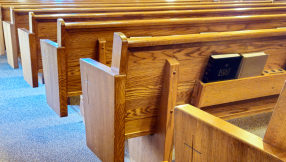A Palestinian Christian perspective on Suicide Bombings?
Not many readers would be in a position to confront the type of 14-year-old boy I did on a recent visit to Palestine. He said to me with pride: "My father was a martyr and my cousin was a bomber and blew up Jews in Jerusalem." Had there been time for more sustained conversation, the 36-page booklet by Dr. Naim Ateek entitled Suicide Bombers: What is Theologically and Morally Wrong with Suicide Bombings? A Palestinian Christian Perspective would have shown me the direction to take.
Ateek does not take the easy route of simple condemnation and moral outrage but points first to the need to understand the context from which the bombings arose in Israel and Palestine. In this he is very clear, ascribing the beginnings in 2000 to the failures of the Oslo Agreement, and perhaps the Palestinian Authority, to curb the restrictions on movement, confiscations of land, demolition of houses, devouring of water resources, incursions of settlements, killings and constant humiliations that mark the oppressive occupation of the West Bank, East Jerusalem and Gaza by the Israeli government since 1967.
He tells us the suicide bombers have direct experience of these factors, and have been nurtured by the high unemployment, the harassment of the checkpoints, the death of a loved one and sometimes the need to redeem themselves from having been recruited as collaborators in the Israeli prison camps. They see themselves as engaged in a war. "As Israeli soldiers shell and kill Palestinians indiscriminately, Palestinian suicide bombers strap themselves with explosives and kill Israelis indiscriminately," Dr. Ateek writes.
In a succinct page, Ateek offers a Muslim perspective, noting the close relationship between nationalism and faith, and the difference between those Muslims who believe in the martyr's path to heaven and those who emphasize that the Quran has many verses prohibiting the harming of others. He quotes a western chaplain at Georgetown University, Imam Yahya Hendi: "While there are passages in the Quran like the Old Testament of the Bible that celebrate military victory, the overall gestalt of the Quran promotes a more restrained view."
After a brief but interesting discussion on the questions posed by Samson's death in the Old Testament and its relation to the issue, wondering if that is to be condemned, he gives eight points explaining why Christians are opposed to suicide bombers. If there is an overarching principle that guides him here, it is that, as Christians, we believe in life before death as well as after death. Oversimplified by your reviewer, the points are as follows:
1. Suicide is a crime against the God who has given us life.
2. However noble the cause, it is wrong to inflict death and suffering on others.
3. Christians are called to confront evil and injustice without using evil methods.
4. Christians are called to model themselves on Christ and break the logic of revenge killings.
5. The god of both the bombers and Israeli religious extremists, including some Christian Zionists, justifies war, violence and terrorism. This understanding must be rejected in the name of the God of love, mercy and peace that we see in Jesus Christ.
6. Christians must not fall into the despair of the bombers. Christ is to be found in the midst of suffering and injustice.
7. Suicide bombers, much like the Israeli army in its treatment of the Palestinian towns with curfews and closures, practice collective punishment. This is immoral as it affects the innocent and is prohibited by the Fourth Geneva Convention.
8. Our duty is to stay alive so we can witness to the truth and take every opportunity to use our life to build a better society, rather than destroy that gift.
In a resounding conclusion, Ateek affirms his belief that Israelis and Palestinians must learn to live and share the land together and the sooner the occupation is ended the sooner there will be an end to suicide bombers. "Ultimately justice will prevail, the occupation will be over, and the Palestinian, as well as the Israeli, will enjoy freedom and independence. How do I know that this will take place? I know because I believe in God."
Though I would have liked to see a little more about thoughts from Middle Eastern Muslims on the topic within the wider context, anybody seeking a sensitive introduction to the issue could well begin here.
An online version of the booklet is available at:
http://www.sabeel.org/old/news/cstone25/suicidebombers.htm
About the author of the booklet:
Dr. Naim Ateek, co-founder and director of the Sabeel Ecumenical Liberation Theology Centre in Jerusalem (see www.sabeel.org), was the first to articulate a Palestinian theology of liberation in his book Justice, and only Justice, a Palestinian Theology of Liberation (1989). The book laid the foundation of a theology that addresses the conflict over Palestine and explores the political as well as the religious, biblical and theological dimensions. He has edited and written other books and articles. A former canon of St. George's Cathedral, Jerusalem, now retired, he lectures widely both at home and abroad.
About the reviewer:
* Rev. Canon Dr John Aves, honorary canon of Norwich Cathedral, United Kingdom, died of a heart attack on 25 January 2004 in Bethlehem where he was serving as a WCC ecumenical accompanier. Aves was 52. His work with Israeli peace groups and in the Deheisha refugee camp signalled his commitment to non-violent action, while the stories he wrote as an ecumenical accompanier showed his compassion, comprehension and deep understanding of each person he met.
------------------------------------------------
The World Council of Churches is a fellowship of churches, now 342, in more than 120 countries in all continents from virtually all Christian traditions. The Roman Catholic Church is not a member church but works cooperatively with the WCC. The highest governing body is the assembly, which meets approximately every seven years. The WCC was formally inaugurated in 1948 in Amsterdam, Netherlands. Its staff is headed by general secretary Samuel Kobia from the Methodist church in Kenya.













